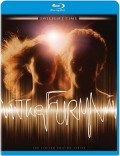| Reviews & Columns |
|
Reviews DVD TV on DVD Blu-ray 4K UHD International DVDs In Theaters Reviews by Studio Video Games Features Collector Series DVDs Easter Egg Database Interviews DVD Talk Radio Feature Articles Columns Anime Talk DVD Savant Horror DVDs The M.O.D. Squad Art House HD Talk Silent DVD
|
DVD Talk Forum |
|
|
| Resources |
|
DVD Price Search Customer Service #'s RCE Info Links |
|
Columns
|
|
|
Fury, The
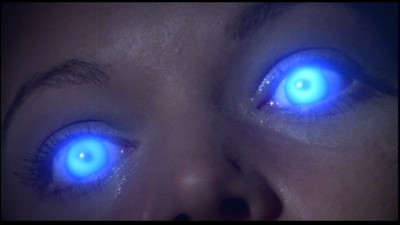
Please Note: The images used here are taken from the film's 2001 DVD release, not the current Blu-ray edition under review.
Like most films by Brian De Palma (Dressed to Kill, Blow Out), 1978's The Fury is of dubious genre: Is it a horror film, with its eerie supernatural story elements? Is it a suspense/political-thriller picture, with its nefarious, secretive, CIA-like government agency waiting around every corner to thwart what's humane, unsullied, and right? Or is it -- seemingly so unlikely, but not so fast -- a comedy, its moments of audacious absurdity even funnier, almost surreally so, in the grim and deadly context? It's De Palma's great gift that he can blend all of these elements together with his magical camera eye and well-absorbed influences/hyper-familiarity with the medium (Hitchcock, himself no stranger to the incongruous humor of suspense-ridden, life-or-death scenarios, being the most oft-cited point of reference), and if some sections of The Fury stand out as a bit unassimilated, like they could've used some more of that De Palma alchemy, when it works, it's another one of those savvy, self-conscious, pastiche-laden, yet utterly mesmerizing and affecting pictures that make De Palma's films among the few you can call "postmodern" and mean it as an unqualified compliment.
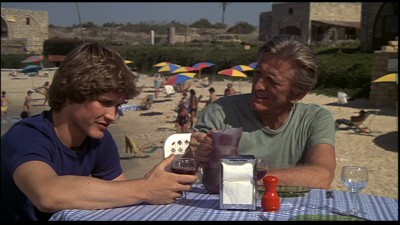
Story-wise, The Fury revisits a theme -- young people, specifically a young woman, who find themselves blessed/cursed with telekinetic powers -- familiar from De Palma's preceding picture, the eternally popular and beloved Carrie. This time, though, it's not just high-school pecking orders and religious-maniac parents persecuting the innocuously unique kids: In this one, late-adolescent Robin Sandza (Andrew Stevens), whose special powers are benevolently understood and accepted by his federal (read: CIA) agent father (Kirk Douglas), is getting kidnapped and "studied" for possible Cold-War use against the Chinese or the Soviets by his dad's agency's amoral new guard, represented by the evilly grinning Agent Childress (a perfectly cast John Cassavetes, actually outdoing his projection of smiling, mercenary heartlessness from Rosemary's Baby). The father, having survived Childress's assassination attempt, seeks help through a nurse (Carrie Snodgress) working at an institute for the telepathically gifted, whose newest resident, Gillian (Amy Irving) -- a sweet girl whose power manifests as a troubling, uncontrollable penchant to make people around her bleed (sometimes to death) when she's overcome with intense feeling or distress -- will be recruited by the elder Sandza in his quest to find his boy; targeted by Childress as a better candidate for weapons-grade telekinesis research after Robin's mentally excruciating testing renders him unstable; and become, like a less self-immolating version of Carrie herself, the film's unlikely heroine, the only one left standing in any position to stand up for her innocent, good-hearted self and against the exploitation and corruption of the government's cynical warmongers.
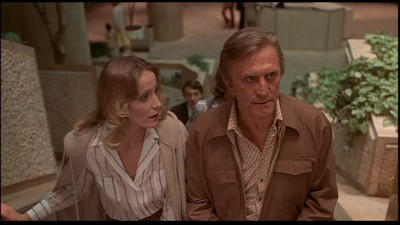
The Fury is, also like Carrie, based on a novel (evidently one with deeper, darker, more complex and far-reaching themes than Stephen King's book, despite its shared concern with telekinetic youth), but in this instance, the novelist himself (John Francis) wrote the screenplay, and it is probably at his feet that the film's relative unevenness, in addition to its layerings, complexities, and political charge, can be laid: It burdens the film with a lot of undigested plot to cover, too much of it done in an overly verbal, too obviously expository manner, leaving visual magician De Palma without enough to do in a few sequences that frankly seem a bit anonymous, obligatory, and out of place (Irving and Douglas shine as they play out Gillian's and the elder Sandza's conversation on the bus after he rescues her from the institute, but this moment is, taken in context, narratively and emotionally redundant/unnecessary, and visually dull). But it's the other, greater stuff -- the numerous sequences that show those conventional stretches up -- that make the film, despite the bumpiness of its course, still ultimately brilliant: De Palma's way with a camera, his worn-on-the-sleeve pleasure in the elaborate visual building of a scene, here reaches some of its highest apices of his career to that point: Hallucinatory/telepathic-revelation scenes afford him a good half-dozen opportunities for various superimpositions and unusual visual strategies, all of which he uses wisely and to impressive effect; he also eagerly accepts the story's invitation to, for example, use some of these telepathic re-livings of another's experience to expand upon the truly disconcerting point-of-view shots he used in Sisters, or to build, out of Gillian's escape from the institute, one of his all-time best drawn-out, slowed-down, minutely detailed action sequences. In that latter bravura feat of filmmaking, without ever detracting from the story with his show of skill (quite the opposite), De Palma delectates in every frame of every second of film, distilling the pleasure of showing us the movement, the second-by-second unfolding of action, almost to the point of abstraction: We're more aware by the second that this is a movie we're watching, but the deep self-awareness of what's onscreen doesn't diminish or defuse our investment; it just prolongs and actively savors the minutiae of cinematic storytelling in a way that makes for the sort of lucid intoxication of which De Palma is the supreme master.
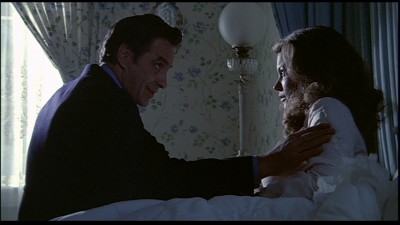
So The Fury sputters a bit along the way, with enough stalls to render it, all things considered, second-tier DePalma. But it offers so many thrills of so many different kinds along the way that we're more than compensated for the drearily just-adequate bits: In addition to the aforementioned virtuoso sequences, John Williams's mostly well-suited score actually lets off the bombast enough to allow for a delicious spooky-Theremin motif, and the cast is almost uniformly stellar (the exception being Stevens as young Brian, though it's possible that his all-American-teen-boy blandness is part of the point). Douglas and Cassavetes bring a classy, old-pro presence and dedication that buoys the sometimes weak-ish dialogue; Irving gives a marvelously enchanting, intelligent performance; and Snodgress surreptitiously steals the show, embracing her character's naïve pluckiness like some '30s comedienne (Carole Lombard comes to mind), gamely making us laugh and ultimately touching us deeply. And the film is firing on all cylinders by the time it gets its second wind and starts really gathering momentum toward its sly, unforgettably explosive conclusion, culminating in a classic DePalma aftershock that roars forth to startle you after you think the carnage is all over (remember the horror-movie nightmares that made us jump at the end of Carrie and Dressed to Kill? This ending amps up the intensity by several notches, and no-one wakes up.)
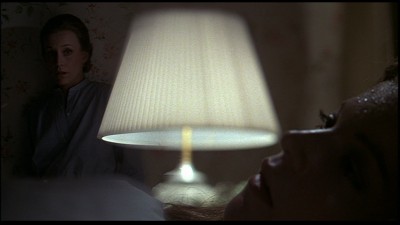
By so mining our very familiarity with the ready-made "suspense," "horror," and B-movie schlock used as building-block pretexts in The Fury (and in many, if not most, of his other films), DePalma is "postmodern" in the most active, fruitful way imaginable, not simply coasting on our recognition or merely milking it for easy, snarky, simplistically debunking laughs (à la the Scary Movie parodies) with his self-conscious exposure of the mechanics and artifices at work, but discovering and exploiting fresh combinations, new ways of crystallizing the pleasure we take in being told a story, drawing out new dimensions and finding the last remaining angle on the alternating belief, disbelief, and slippery meanings in the ways the movies have most memorably captivated us with their yarns. Perhaps he's wringing the last drop, tapping the last source of the possibilities of cinematic Pop-Art pastiche, exhausting the possibilities of that approach, by orchestrating so directly this tension between the shiny, cleverly and beautifully executed, entirely self-aware inauthenticity he delightedly deals in and the real engagement, responses, and feelings he nevertheless elicits with such unmatched skill and flair. The Fury stands with De Palma's other corrosive homages to the stark allure of action/suspense/thrill-drenched B-movie wonderment, and is yet another compulsively watchable, convincing, multifariously disturbing exhibit in the strong case that, Quentin Tarantino notwithstanding, DePalma was the last and greatest postmodern filmmaker -- the one who could pull off being sincerely insincere, the one who got to have his cake, eat it, and still have enough left over to give us all a generous slice as well.
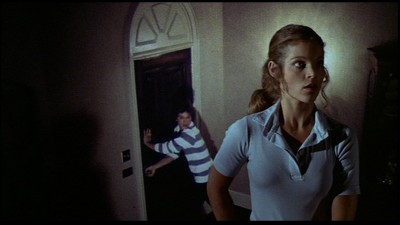
Video:
This transfer of The Fury, preserving the film's original aspect ratio of 1.85:1, is very nice; all of the colors and contrasts of Richard H. Kline's cinematography are perfectly preserved, with natural skin tones and dark/black/nighttime scenes that retain as much solidity as they had originally. (There's a certain endemic grit and grain in Kline's aptly diffuse lighting/lensing, which counts among the film's important aesthetic properties and thankfully has not been tampered with through digital noise reduction.) Nary a trace of compression artifacts such as aliasing or edge enhancement with its accompanying haloing effect are discernible at any point to mar the conscientiously attended-to picture quality here.
Sound:For whatever reason, the film seems to suffer at the source from technically rough sound; dialogue, especially the louder (screaming, yelling) it goes, has some noticeable distortion to it, and there seems to be a bit of imbalance between the louder moments and the simply spoken bits, which makes it hard to discern what's being said at certain points. (This is based on audio heard on the older DVD edition, as well as in the trailers for the film included as extras.) However, Twilight Time presents the sound as well as it can be, with reasonable clarity, fullness, and fidelity, and does the prior DVD release, which included only the Dolby Digital 4.0 soundtrack, one better by including the film's original mono sound (as a DTS-HD Master Audio 2.0 soundtrack) as well as the improved DTS-HD Master Audio 4.0 soundtrack, which does make some of the dialogue, for example, better integrated; despite my usual preference for the most "original" experience possible, this option seems like the way to go in this particular instance. Optional English subtitles are included, as well as an isolated-score option.
Extras:Not much save for the film's fun, hyperbolic-B-movie theatrical trailer and an onscreen catalog of other Twilight Time releases.
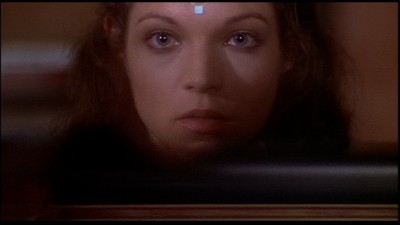
On first blush, Brian De Palma's The Fury, with its similar but thinner-spread story of unfairly misused/put-upon ESP kids and smaller-scale Grand-Guignol/apocalyptic ending, might have seemed like a somewhat disappointing followup to the director's hit from '76, Carrie (The Fury, also prominently featuring a principal supporting player from Carrie -- Amy Irving -- came out in 1978.) But the similarities are more or less superficial; The Fury is a different creature altogether, a deeper, darker (though more uneven and less focused overall) work that bridges, in a fascinating, unpredictable, and more often than not successful way, the wittily filmed, uniquely suspenseful, laughing-gas-fueled bloody violence of his name-making '70s work (Sisters, Carrie) and the aggressively political streak of his earliest, late-'60s stuff (e.g., Hi, Mom!) that would resurface more brilliantly a few years later in his career masterpiece, 1981's Blow Out. It's Kirk Douglas as the well-meaning but lagging-behind secret government guy (read: CIA) trying to stop the more powerful, utterly amoral new generation (John Cassavetes), who's kidnapped Douglas's son, from exploiting and corrupting the teenager's telepathic powers as some sort of Cold War weapon, with the one outside/civilian element, a sweet and pretty girl also extrasensorily gifted (Amy Irving), left to pull a Joan of Arc and spectacularly save the day, in the process visiting the rage (or, you could say, "fury") of a disillusioned, defeated peace-and-love youth (remember, this was the malaise-ridden Carter years and the dawning of a loooong Reagan-Bush era) on the cynical old warmongers in a most gratifying fashion, with the film's final moments making you gasp and laugh at the same time (they really have to be seen to be believed). The film is ambitious and frequently glorious, but it doesn't always hold together; too much talky/plot-y stuff, though executed skillfully enough (and with Douglas's and Irving's chops adding interest), feels like a bit of a drag, redundant filler when laid out next to De Palma's elaborately choreographed, astoundingly and imaginatively achieved set pieces, his perennial ability to give you the story on purely visual terms and at the same time blur the line between horror and comedy in a way that undermines neither and usually maximizes both. The strengths easily outweigh the weaknesses, though, and when it's at its best, The Fury is the best that De Palma had to offer up to that point in his career, its inimitably adroit, propulsive flights of sheer, sustained, imaginative fluency in the language of cinema the stuff that movie dreams (and nightmares, and anxious giggling fits) are made of. Highly Recommended.
|
| Popular Reviews |
| Sponsored Links |
|
|
| Sponsored Links |
|
|
| Release List | Reviews | Shop | Newsletter | Forum | DVD Giveaways | Blu-Ray | Advertise |
|
Copyright 2024 DVDTalk.com All Rights Reserved. Legal Info, Privacy Policy, Terms of Use,
Manage Preferences,
Your Privacy Choices | |||||||









